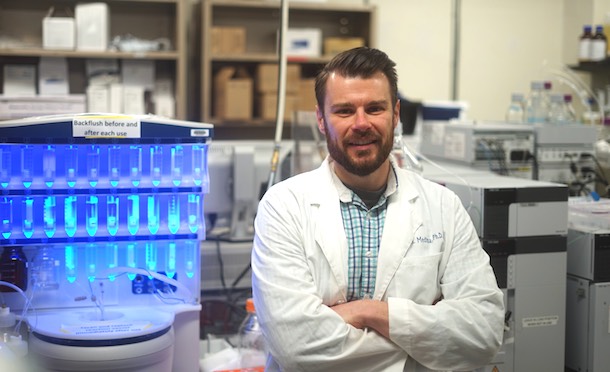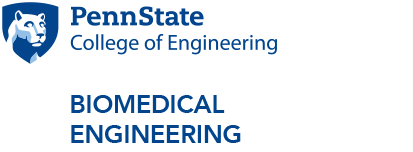
Scott Medina
Medina to use NSF CAREER Award for improved precision medicine
3/21/2019
UNIVERSITY PARK, Pa. — Supported by a new National Science Foundation (NSF) Early Career (CAREER) award, Scott Medina, assistant professor of biomedical engineering, is developing new bio-nanomaterial technologies that can be guided and activated by ultrasound to deliver proteins into cells with high precision. This process has multiple potential medical applications, including improved treatment of genetic disorders and cancer drug therapies with fewer side effects.
The research that Medina will conduct over the five years covered by the award involves phase-changing nanomaterials (PCNs)--materials having nanoscale dimensions that can undergo a change in physical phase, such as liquid-to-gas, in response to a specific stimulus. While medical professionals have used PCNs as ultrasound imaging agents, loading them with proteins for drug delivery has been a challenge. This is because fluorous solvents, the highly fluorinated compounds used in PCN preparation, are chemically incompatible with water soluble proteins used for drug delivery.
“To put it another way, this is like trying to dissolve an egg in the liquid Teflon coating used on non-stick cookware,” Medina said.
Medina proposes developing a new family of PCNs that can be loaded with proteins and guided to the surface of cells. The proteins are masked with a fluorous coating to enable their efficient encapsulation into the PCNs. Once localized on the cell surface, researchers will use ultrasound as a stimulus to vaporize the coating, a process that also forms a pore in the cell membrane without damaging the proteins. Via the pore, the therapeutic proteins are then delivered into the cells unharmed.
One of the benefits of this method is taking diagnostic ultrasound techniques already employed in nearly every hospital and leveraging them for precision drug delivery.
“In the future, we expect these new nano-materials may be readily adopted into the clinic to have broad impact across biomedicine,” Medina said. “For example, they may be able to selectively deliver new protein-based drugs to cancer cells with fewer side effects or allow tissue-specific gene editing and cellular reprogramming to treat genetic disorders. There are a wide range of possibilities with this system, and it is our hope that it will open up a variety of new opportunities in precision medicine.”
Medina will also use his CAREER award to advance K-12 STEM—Science, Technology, Engineering and Math—education. His research findings will be integrated with outreach activities that will incorporate principles of biomaterial design and biophysics into K-12 education for students in low-income areas.
One of these outreach activities will combine underprivileged high school students, industry engineers and Penn State undergraduate students into multidisciplinary engineering design teams.
“We will pair students from a local rural high school with Penn State biomedical engineering undergrads to collaborate on the design and manufacture of a 3D-printed acousto-fluidic device,” Medina said. “This device prototype allows us to use an optical microscope during our research to better observe and monitor how a solution of particles behave when exposed to ultrasound.”
In addition, Medina will collaborate with the Penn State Center for Science and the Schools to develop an ‘Ultrasound Olympics’ workshop for grades 6-12 teachers. Medina envisions this will address “leaks” in the STEM education pipeline.
“We want to prevent the loss of intelligent and highly capable undergraduate students from STEM majors, many of which are first-generation students and from low-income backgrounds,” Medina said. “In fact, more than half of all STEM undergrads will not complete their degree. Through this project we hope to improve the recruitment and retention of these valuable scholars in engineering disciplines.”
The CAREER Award is the most prestigious award offered by the NSF in support of early-career faculty.



